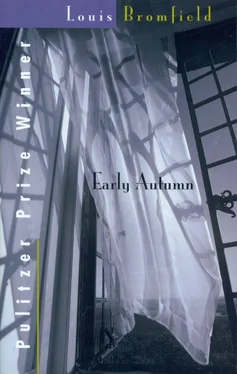“It wouldn’t have made the least difference. I meant to have you, too.” A sudden impatient frown shadowed the young face. “You won’t let anything change you, will you? Nothing that anyone might say … nothing that might happen … not anything?”
“Not anything,” she repeated. “Not anything in the world. Nothing could change me.”
“And you wouldn’t mind going away from here with me?”
“No. … I’d like that. It’s what I have always wanted. I’d be glad to go away.”
“Even to the Argentine?”
“Anywhere … anywhere at all.”
“We can be married very soon … before I leave … and then we can go to Paris to see my mother.” He sat up abruptly with an odd, troubled look on his face. “She’s a wonderful woman, darling… beautiful and kind and charming.”
“I thought she was lovely … that day in Paris … the most fascinating woman I’d ever seen, Jean dear.”
He seemed not to be listening to her. The wind was beginning to die away with the heat of the afternoon, and far out on the amethyst sea the two sailing ships lay becalmed and motionless. Even the leaves of the twisted wild cherry tree hung listlessly in the hot air. All the world about them had turned still and breathless.
Turning, he took both her hands and looked at her. “There’s something I must tell you … Sybil … something you may not like. But you mustn’t let it make any difference. … In the end things like that don’t matter.”
She interrupted him. “If it’s about women … I don’t care. I know what you are, Jean. … I’ll never know any better than I know now. … I don’t care.”
“No … what I want to tell you isn’t about women. It’s about my mother.” He looked at her directly, piercingly. “You see … my mother and my father were never married. Good old Monsieur de Cyon only adopted me. … I’ve no right to the name … really. My name is really John Shane. … They were never married, only it’s not the way it sounds. She’s a great lady, my mother, and she refused to marry my father because … she says … she says she found out that he wasn’t what she thought him. He begged her to. He said it ruined his whole life … but she wouldn’t marry him … not because she was weak, but because she was strong. You’ll understand that when you come to know her.”
What he said would have shocked her more deeply if she had not been caught in the swift passion of a rebellion against all the world about her, all the prejudices and the misunderstandings that in her young wisdom she knew would be ranged against herself and Jean. In this mood, the mother of Jean became to her a sort of heroic symbol, a woman to be admired.
She leaned toward him. “It doesn’t matter.… not at all, Jean … things like that don’t matter in the end. … All that matters is the future. …” She looked away from him and added in a low voice, “Besides, what I have to tell you is much worse.” She pressed his hand savagely. “You won’t let it change you? You’ll not give me up? Maybe you know it already … that I have a grandmother who is mad. … She’s been mad for years … almost all her life.”
He kissed her quickly. “No, it won’t matter. … Nothing could make me think of giving you up … nothing in the world.”
“I’m so happy, Jean … and so peaceful … as if you had saved me … as if you’d changed all my life. I’ve been frightened sometimes. …”
But a sudden cloud had darkened the happiness … the cloud that was never absent from the house at Pentlands.
“You won’t let your father keep us apart, Sybil. … He doesn’t like me. … It’s easy to see that.”
“No, I shan’t let him.” She halted abruptly. “What I am going to say may sound dreadful. … I shouldn’t take my father’s word about anything. I wouldn’t let him influence me. He’s spoiled his own life and my mother’s too. … I feel sorry for my father. … He’s so blind … and he fusses so … always about things which don’t matter.”
For a long time they sat in silence, Sybil with her eyes closed leaning against him, when suddenly she heard him saying in a fierce whisper, “That damned Thérèse!” and looking up she saw at the rim of the hill beyond the decaying tombstones, the stocky figure of Thérèse, armed with an insect net and a knapsack full of lunch. She was standing with her legs rather well apart, staring at them out of her queer gray eyes with a mischievous, humorous expression. Behind her in a semicircle stood a little army of dirty Polish children she had recruited to help her collect bugs. They knew that she had followed them deliberately to spy on them, and they knew that she would pretend blandly that she had come upon them quite by accident.
“Shall we tell her?” asked Jean in a furious whisper.
“No … never tell anything in Durham.”
The spell was broken now and Jean was angry. Rising, he shouted at Thérèse, “Go and chase your old bugs and leave us in peace!” He knew that, like her mother, Thérèse was watching them scientifically, as if they were a pair of insects.
3
Anson Pentland was not by nature a malicious man or even a very disagreeable one; his fussy activities on behalf of Morality arose from no suppressed, twisted impulse of his own toward vice. Indeed, he was a man of very few impulses—a rather stale, flat man who espoused the cause of Morality because it belonged to his tradition and therefore should be encouraged. He was, according to Sabine, something far worse than an abandoned lecher; he was a bore, and a not very intelligent one, who only saw straight along his own thin nose the tiny sector of the universe in which circumstance had placed him. After forty-nine years of staring, his gaze had turned myopic, and the very physical objects which surrounded him—his house, his office, his table, his desk, his pen—had come to be objects unique and glorified by their very presence as utensils of a society the most elevated and perfect in existence. Possessed of an immense and intricate savoir-faire he lacked even a suspicion of savoir-vivre, and so tradition, custom, convention, had made of his life a shriveled affair, without initiative or individuality, slipping along the narrow groove of ways set and uninteresting. It was this, perhaps, which lay at the root of Sybil’s pity for him.
Worshiping the habit of his stale world, he remained content and even amiable so long as no attack was made upon his dignity—a sacred and complicated affair which embraced his house, his friends, his clubs, his ancestors, even to the small possessions allowed him by his father. Yet this dignity was also a frail affair, easily subject to collapse … a sort of thin shell enclosing and protecting him. He guarded it with a maidenly and implacable zeal. When all the threats and pleadings of Aunt Cassie moved him to nothing more definite than an uneasy sort of evasion, a threat at any of the things which came within the realm of his dignity set loose an unsuspected, spiteful hatred.
He resented O’Hara because he knew perhaps that the Irishman regarded him and his world with cynicism; and it was O’Hara and Irishmen like him—Democrats (thought Anson) and therefore the scum of the earth—who had broken down the perfect, chilled, set model of Boston life. Sabine he hated for the same reasons; and from the very beginning he had taken a dislike to “that young de Cyon” because the young man seemed to stand entirely alone, independent of such dignities, without sign even of respect for them. And he was, too, inextricably allied with O’Hara and Sabine and the “outlandish Thérèse.”
Olivia suspected that he grew shrill and hysterical only at times when he was tormented by a suspicion of their mockery. It was then that he became unaccountable for what he said and did … unaccountable as he had been on that night after the ball. She understood that each day made him more acutely sensitive of his dignity, for he was beginning to interpret the smallest hint as an attack upon it.
Читать дальше












